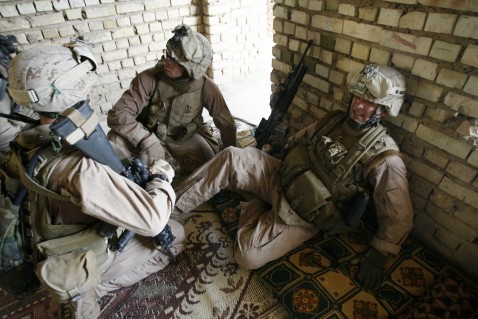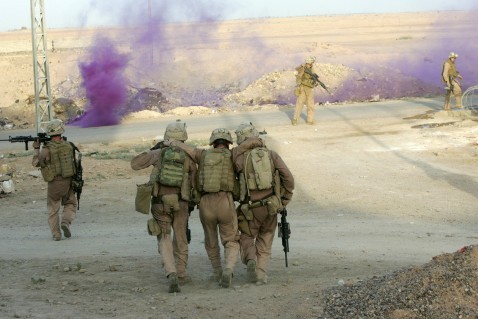**** SCROLL FOR UPDATES ****
In an interesting discussion thread at the Small Wars Journal, an LA Times article is linked that examines the effectiveness of combat outposts.
The neighborhood outposts that the U.S. military launched with great fanfare in Baghdad early this year were supposed to put more American patrols on the streets and make residents feel safer. But some soldiers stationed at the posts and Iraqis who live nearby say they are doing the opposite.
The outposts, along with joint U.S.-Iraqi security stations, form a cornerstone of the current Iraq strategy. Following a classic counterinsurgency tenet, military planners are trying to take U.S. forces out of their distant, sprawling military bases and into the day-to-day lives of Iraqis.
Here there is an unspoken problem that they are trying to address with this tactic, and it is the Ratio of Support to Infantry. Infantry has always been out on patrol, raids, peacekeeping, nonkinetic operations, constabulary operations, etc. The overgrown fraction of support troops, at least many of them, have not made it off of FOBs. Combat outposts will not solve that problem. Continuing:
Although senior U.S. commanders and mid-level officers say they believe the bases are starting to work, many soldiers stationed at the outposts are doubtful, arguing that the burden of protecting the bases means they spend less time on the streets.
“They say we are spending more time ‘in sector,’ which we are doing — we live here,” said Spc. Tyrone Richardson, 24, a member of Charlie Company, 1st Battalion, 8th Cavalry, that operates in the east Baghdad neighborhood of Ubaidi, outside Sadr City. “But we aren’t spending the time patrolling.”
Iraqis who live nearby say they feel less safe now, because many of the bases have quickly become magnets for rocket and mortar attacks. When attacks miss the troops, they often hit Iraqi civilians.
For some, the risk of rocket attacks might be worth it if the Americans were driving away Shiite Muslim militias that many say act as death squads. But some junior soldiers say that Al Mahdi militiamen loyal to anti-U.S. Shiite cleric Muqtada Sadr are able to conduct more “patrols” of the area than can the U.S. Army.
“The Mahdi army goes around to the houses more than we do,” said Pfc. John Evans, 21, a member of 1-8 Cavalry’s Alpha Company.
When advocates of the current troop buildup pushed the U.S. to more aggressively adopt counterinsurgency tactics, their main criticism was directed at the sprawling bases where troops were stationed.
Moving soldiers to smaller bases inside Baghdad, according to the counterinsurgency experts, would allow them to spend more time interacting with the population. Regular contact with U.S. troops would make people feel safer, the main mission of counterinsurgency operations.
In practice, however, the outpost strategy has a key flaw: As many as half of the soldiers there at any one time are dedicated to protecting the outpost.
Here we may observe a fundamental law of geometry. Let’s take a cube, 4 X 4 X 4 units. Its volume is 64 cubic units. Its surface area is computed to be 96 square units. Now take the same volume, except divided into 1 X 1 X 1 units, and the surface area for the same volume is computed to be 384 square units, four times the previous surface area. This is why ice melts faster when crushed into smaller pieces. An analogous point can be made about the perimeter, where the perimeter of the contiguous square is 16 units, and the perimeter of the divided area (1 X 1) is 64 units, or four times the circumference for the contiguous area. The point is that there is an economy of scale. The same volume (or area) divided into smaller units gives a larger surface area to volume ratio (or circumference to area ratio). The larger FOBs require less to provide force protection than smaller combat outposts. On the other hand, the situation is worse than described by this little mathematical example, since the FOBs are not shut down with the emergence of the combat outposts. Force protection is made extemely difficult with the emergence of combat outposts. Continuing:
“In my tactical opinion, the combat outpost hasn’t worked,” said one junior officer stationed in east Baghdad. “It’s not a bad idea, but we are doing it wrong. We have a bigger presence but we have less boots on the ground. You only have one platoon that can maneuver tactically at a time.”
Many of the soldiers interviewed asked to speak anonymously because senior officers disapprove of noncommissioned officers and junior officers questioning military strategy.
Many of the large bases outside the city are protected by support soldiers or security units not available for the outposts.
Before the outposts were created, some companies maintained a constant presence on the streets, with each of their platoons doing two eight-hour patrols a day.
“Before, we would do two patrols a day, of six to eight hours a day. There was almost always a patrol on the street. Now we patrol just 12 times in a month,” an experienced noncommissioned officer said. “That’s not a lot of interaction with the people. And it’s problematic if the intent of this strategy is to interact with locals.”
As a result of the decrease in the number of patrols, some officers say, they are not even able to keep militia elements out of the neighborhoods immediately surrounding the outposts.
“I just know it’s not much different than it was seven months ago,” said one junior officer in east Baghdad. “We are retaking the same ground every day.”
David Kilcullen, the senior counterinsurgency advisor for the U.S. military command in Iraq, said not all the outposts were being used correctly. The outposts, he said, should not be mini-camps but rather a patrol base used for breaks between walking the neighborhood.
“You should not think of it as a nest where you retreat to and hunker down in,” said Kilcullen, a lieutenant colonel in the Australian army reserves.
On balance, he said, the concept is working and is helping to protect Iraqi neighborhoods.
“We are covering an area continuously rather than just visiting it,” Kilcullen said. “If you do not provide continuous coverage, that creates opportunities for insurgents to come in and kill the population.”
Still, other problems remain. Although one purpose of the outposts is to allow Iraqis to walk up to Americans and give them tips, the little bases are generally imposing structures ringed by machine-gun nests and high concrete walls.
1st Lt. Luis Marin, 31, Charlie Company’s executive officer, acknowledges that the need to put many of the soldiers on guard duty and erect high walls around the outposts presents challenges. But he says it is unavoidable.
“The No. 1 priority has to be to protect the outpost, and you have to use soldiers for force protection,” he said. “It almost looks like we are pushing people away, and that is not what we want to do.”
There is no doubt the outposts face threats. When what GIs ironically call “Happy Hour” begins each afternoon in east Baghdad, the soldiers of the 1-8 Cavalry seek cover in a concrete building from the rocket and mortar fire from Shiite militias.
Because the rockets are not accurate, after each attack soldiers check to see whether any residents have been hurt.
Charlie Company has been delivering fuel and water to a man who was seriously injured in an attack. After a recent visit to the injured man, Sgt. 1st Class Alberto Gordillo, 31, was confronted by another resident who lived near the site from which militants were firing rockets at the post.
“Why are you shooting at my house? Why shoot at us? We are not shooting at you,” the man said. Gordillo tried to calm him, and explain what had happened.
“If they shoot mortar rounds at us, if we positively ID them, we will shoot back. If we don’t, they won’t stop,” he said. “But we are not aiming at your house.”
In some Sunni neighborhoods in west Baghdad, such as Ghazaliya, some residents who were initially excited about the outposts and joint security stations have grown disgruntled. They believe the Americans are doing too little to stop attacks by Shiite militias and are intent on targeting only Sunni insurgents.
“The Americans won’t come out to help unless they have orders,” said Abdul Rahman, 29, a chemist. “They don’t prevent the Mahdi army from attacking us.”
In Shiite neighborhoods, residents say the opposite, arguing that the outposts are targeting Shiite militias, prompting militants to strike back.
“Since they started firing mortar rounds at the outpost, it has become very chaotic,” said Ali Bahadli, a clothing salesman in his 20s who lives near the U.S. outpost in the Baladiyat neighborhood of east Baghdad. “When the Americans go out, I say, ‘Here comes trouble.’
“Some hate the Americans for the mortars. Others hate the Mahdi army,” he said. “I blame the Americans. These mortars start when they go out and arrest someone.”
Lt. Col. Jeffrey Sauer, the commander of the 1-8 Cavalry, said the benefit of the troops’ presence is seen in the increased numbers of warnings of possible roadside bombs and information about suspected insurgents that is being called in to the tip lines.
“Six months ago, my ability to gain intelligence in the neighborhoods was very minimal,” Sauer said. Now, based on “information provided to my soldiers on patrol, information through the tips line,” he said, “I have between 10 and 20 good pieces of information a day. That is a significant difference.”
To some of the soldiers, however, the quality of the intelligence seems thin. They say many of the tips are actually traps aimed at hitting them with bombs as they leave the post to check out the information.
Soldiers who defend the use of the outposts say their chief advantage is cutting down the time it takes to help patrols that have been hit in roadside bombings.
“The theory was to get us more hands-on with the people, more face time, and reduce our response time. That has been beneficial — when the unit is hit, we can respond quickly,” said Sgt. Scott Snyder, 36, of Charlie Company. “But as far as face time, we still get the same amount.”
There is further recommended reading on combat outposts:
- Ramadi Combat Outposts
- Combat Outpost Vulnerabilities
- Recent Combat Outposts Built in Anbar (more here)
- Combat Outposts Built in Baghdad to Accomodate the “Surge”
- The Earlier Days of Combat Outposts in Anbar
Combat outposts were initially used in Anbar to take urban terrain which had essentially seen no Marine. In Baghdad, this is not the case, and the parallel application of combat outposts might be dubious. There are pros and cons associated with the use of this tactic, and it should be used circumspectly and wisely.
**** UPDATE ****
I am reminded by Michael Fumento’s comment that he authored a good and ground-breaking piece on this very subject from an embed in Ramadi. Parts of it follow, and it helps to set the context for the proper use of COPs.
The capital of al Anbar Province, Ramadi remains for U.S. troops the most violent city in Iraq. Yet as I reported in my November 27th “Return to Ramadi





